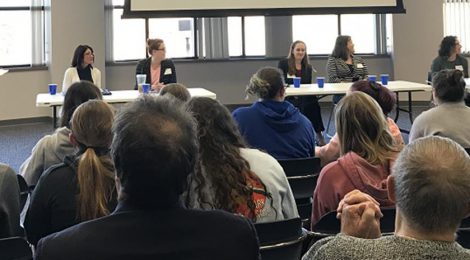
TMU Staff Innovation Challenge – Rewards
In spring 2019, two presentations were entered for the Innovation Rewards portion of the Staff Challenge. Following is a synopsis of the winning entries:
First Place entry: An Innovative Program to Attract and Retain High-Achieving Students: The Cleves Scholars Program, presented by John Ernst, Robin Norton, Heather Abbott, and Samantha Palmer (TSC) Justin Vogel, Lam Pham, Tony Otten (Enrollment)

Panel Discussion with Father Gerald Twaddell, Acting President Kathleen S. Jagger, Monsignor William Cleves, and Professor Luis Sierra.
Innovation: A new scholars program at TMU that leverages the Success Center institutes and faculty-led courses to help students take the next-step for success.
Question at issue–how can we attract and support more high achieving students?
Innovation: The new Cleves Scholars Program combines: coursework aimed at translating ideas into action; co-curricular activities aimed at facilitating the 4Cs: Community, Career, Character, and Classroom; and service projects aimed at promoting responsibility towards others. Named after past-president and philosophy department chair, Monsignor William Cleves.
Innovation details: Engage applicants through interviews – high school applicants invited to apply have GPA >= 3.25 and ACT >= 26; complete essay and interview; interview day (a key to program success) with faculty, staff, and current students; Cleves scholarships part of financial aid packaging; result – 38 students accepted scholarships with 74 offered (51 percent conversion rate with an average HS GPA: 3.9, ACT: 27.9)

2019 alumni panel discussion on liberal arts/career connections.
Retain students through inventive programming – new first year student and capstone courses emphasize ideas to action: Leisure (Father Twaddell) and Identity (Professor Blackwell); 2018-2019 co-curricular programs emphasize networking skills and development: team-building exercises, networking workshops and events with local employers and leaders, faculty panel, alumni panel, LinkedIn workshop, student business cards; service to TMU supporting the annual Christmas Party for friends of the university.
Link to TMU mission: Program development guided by the ROI map and 4Cs adapted from the 2020 strategic plan and TMU Mission – 1. Community (scholars program is a new community for high achieving students, scholars give back to the larger community through service to others), 2. Career (scholars engage in career development and networking skills from start of their university experience), 3. Character (through teamwork, giving to others, and other program components, scholars reinforce character), and 4. Classroom (through innovative courses, students develop in their abilities to translate ideas into action)
Cleves Scholars Program adds value to TMU: Recruit and retain high achieving students • Laboratory for testing new programming ideas with ability to be scaled • Provide students with launch pad for success.

Second place entry: Auto-packaging of financial aid for TAP students, presented by Mark Messingschlager
Summary: All TAP programs operated under a non-term structure, meaning they did not follow traditional semesters. This allowed “rolling starts” into the program at any point throughout the calendar year. This made packaging financial aid very difficult and required that it be done manually for each student for each award year. After a series of major steps, the TAP programs are offered in standard terms with modules which still allows multiple starts throughout the year, but allows the financial aid process to be automated.
Problems: • Manual process, with no reliable reporting to identify issues • Delayed receipt of Admissions decisions • Delayed receipt of FAFSA data • Delayed registration of students • Prone to audit findings • Not able to run SAP (required for Title IV programs)
Key Players:

Comments are closed, but trackbacks and pingbacks are open.